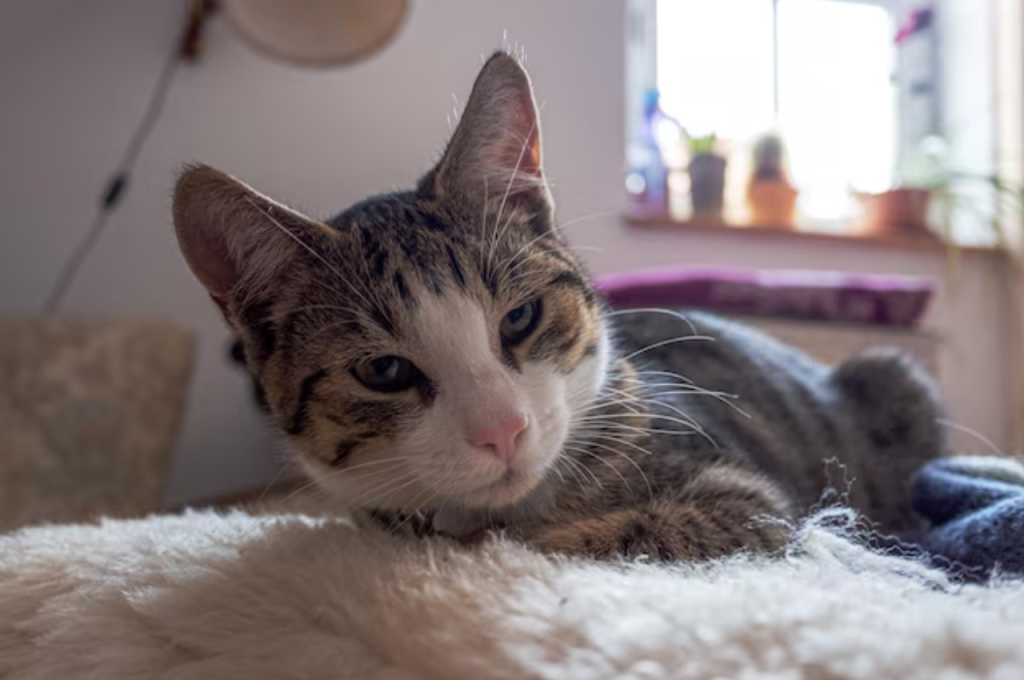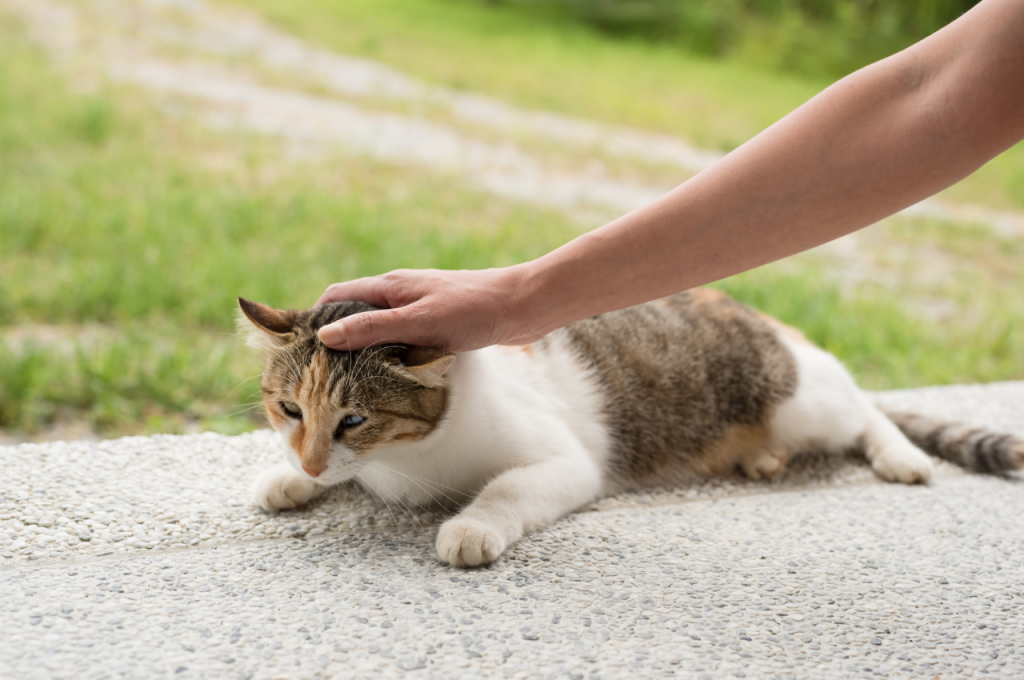To relax an overstimulated cat, create a quiet, safe space and avoid loud noises or sudden movements. Provide familiar toys or blankets for comfort.
Additionally, use calming pheromones or soothing music to help your cat unwind. Be patient and allow your cat to retreat and decompress. Remember, every cat is unique, so pay attention to their individual needs and preferences. Taking these steps can help your feline friend relax and destress in a calm environment. By providing a peaceful atmosphere and gentle interaction, you can help your overstimulated cat feel safe and secure.
Signs of an Overstimulated Cat
An overstimulated cat may display signs such as excessive grooming, restlessness, and aggression. To help relax an overstimulated cat, create a calm environment, provide hiding spots, and engage in gentle play or massage to reduce stress.

Behavioral Changes
An overstimulated cat may exhibit behavioral changes such as increased vocalization, aggression, or hiding away. Restlessness, pacing, or sudden attempts to escape from the situation are common signs of an overstimulated cat. Recognizing the signs of an overstimulated cat is crucial in providing the necessary care and attention. Understanding both the physical cues and behavioral changes can help prevent stress and ensure a happy, relaxed feline friend.
Physical Clues
A cat’s physical clues of overstimulation may include dilated pupils, flattened ears, and a twitching tail. Excessive grooming or self-soothing behaviors like licking can also indicate an overstimulated cat.
Common Triggers for Overstimulation
Cats can become overstimulated from too much petting, loud noises, or sudden changes in their environment. To relax an overstimulated cat, create a calm space with minimal noise and distractions. Gentle, slow petting and providing a favorite toy or treat can also help soothe your cat. Understanding these triggers is key to preventing overstimulation.
Excessive Petting
Cats can become overstimulated from excessive petting, especially if it’s in areas they are sensitive to, such as their belly or tail. This can lead to agitation and aggression.
Loud Noises
Loud noises can startle and overstimulate cats, causing them to feel anxious and stressed. This can lead to hyperactivity or withdrawal as a coping mechanism.
New Environments
New environments can overwhelm and overstimulate cats due to the unfamiliar sights, sounds, and smells. They may exhibit nervous behaviors or seek hiding spots for comfort.
Immediate Actions to Calm Your Cat
When your cat is overstimulated, it’s important to take immediate action to help them relax and find their inner peace. By reducing external stimuli and creating a safe space for them, you can provide the comfort and security they need to unwind. Let’s explore these steps in detail:
Reduce External Stimuli
One of the first things you should do to calm an overstimulated cat is to minimize external stimuli that may be causing them stress. Cats are highly sensitive to their surroundings, and excessive noise, bright lights, or chaotic environments can easily overwhelm them.
To reduce external stimuli:
- Find a quiet room where you can take your cat away from noise and commotion.
- Close the blinds or curtains to dim the lights and create a more soothing atmosphere.
- Avoid loud music or television sounds that can further agitate your cat.
- Keep other pets or children away from your cat’s immediate vicinity to prevent additional stress.
Safe Space Creation
Creating a safe space for your cat is crucial in helping them relax and regain their composure. This designated area will serve as a sanctuary where they can retreat whenever they feel overwhelmed or anxious.
To create a safe space:
- Choose a secluded area in your home where your cat can have some privacy.
- Provide a comfortable bed or blanket for them to rest on.
- Place familiar objects, such as their favorite toys or a piece of clothing with your scent, to make them feel secure.
- Consider using pheromone sprays or diffusers that emit calming scents to create a soothing environment.
- Ensure the safe space is easily accessible and free from any potential hazards.
Remember, the key to calming an overstimulated cat is to minimize external stimuli and create a safe space that promotes relaxation. By implementing these immediate actions, you can help your feline friend find tranquility and restore their inner balance.
Touch Techniques to Soothe Your Cat
Soothe your overstimulated cat with gentle touch techniques. Help them relax by using slow, rhythmic strokes and light pressure on their body. Focus on areas like the head, neck, and back to calm their nerves and create a sense of tranquility.

Cats are known for their love of being petted, but overstimulation can cause them to become anxious or agitated. If your cat is overstimulated, it’s important to use the right touch techniques to help soothe them. Here are some techniques you can use to help calm your cat:
Proper Petting Practices
When petting your cat, it’s important to be aware of their body language. Start by petting them gently and slowly. Avoid touching sensitive areas like their stomach or tail. If your cat seems agitated, stop petting them and give them some space. Remember, each cat is different, so it’s important to pay attention to your cat’s individual preferences.
Massage Therapies
Massage can be a great way to help your cat relax. Start by gently stroking their back in a circular motion. Use gentle pressure and work your way down their body, paying attention to any areas where your cat seems tense. You can also try using a soft brush to massage your cat’s fur. This can help stimulate their skin and release tension. Using the right touch techniques can help soothe your overstimulated cat. Remember to be patient and pay attention to your cat’s body language. With the right touch, you can help your cat feel calm and relaxed.
The Role of Pheromones
When it comes to relaxing an overstimulated cat, understanding the role of pheromones can be incredibly helpful. Pheromones are chemical substances that animals, including cats, use to communicate with each other. These chemical signals can have a calming effect on cats and can be used to create a sense of security and comfort in stressful situations.
Synthetic Pheromone Use
Synthetic pheromones are designed to mimic the natural pheromones that cats produce. They come in various forms, such as diffusers, sprays, or collars, and can be used to create a calming environment for your cat. By releasing these synthetic pheromones into the air, you can help your cat feel more relaxed and reduce their anxiety levels.
Using synthetic pheromones is a simple and effective way to provide a sense of familiarity and security for your cat. The pheromones help create an environment that feels safe and comforting, which can be especially beneficial in situations such as introducing a new pet, moving to a new home, or during loud events like fireworks or thunderstorms.
Natural Calming Scents
In addition to synthetic pheromones, there are also natural calming scents that can help relax an overstimulated cat. These scents can be found in various forms, such as essential oils or herbal remedies. However, it’s important to note that not all scents are safe for cats, as some can be toxic and harmful to their health.
Some safe and effective natural calming scents for cats include lavender, chamomile, and valerian root. These scents can be diffused in the air or applied to a soft fabric that your cat can rest on. The gentle aroma of these calming scents can have a soothing effect on your cat, promoting relaxation and reducing stress.
When using natural calming scents, it’s crucial to ensure that they are specifically formulated for cats and are used in appropriate quantities. Always consult with your veterinarian before introducing any new scents or remedies to your cat’s environment to ensure their safety and well-being.
Nutrition and Overstimulation
When it comes to managing an overstimulated cat, nutrition plays a crucial role in promoting calmness and well-being. Making dietary adjustments and incorporating the right supplements can help alleviate overstimulation and support your cat’s overall health.
Dietary Adjustments
Choosing the right food for your overstimulated cat can make a significant difference in their behavior and stress levels. Opt for high-quality cat food that is rich in protein and essential nutrients to promote relaxation and reduce overstimulation.
Supplements for Calmness
Supplements can be beneficial in promoting calmness and reducing overstimulation in cats. Here are some effective supplements to consider:
- L-theanine: This amino acid found in green tea can help promote relaxation and reduce stress in cats.
- Chamomile: Known for its calming properties, chamomile can be given to cats in supplement form to help alleviate overstimulation.
- Omega-3 fatty acids: Incorporating omega-3 fatty acids into your cat’s diet can support overall well-being and may help reduce stress and anxiety.
When to Seek Professional Help
To relax an overstimulated cat, seek professional help if home remedies don’t work. Consult a vet for tailored solutions.
Behaviorist Consultation
If your cat’s overstimulation leads to aggressive behavior or persistent anxiety, consulting a feline behaviorist can provide valuable insights. These professionals specialize in understanding cat behavior and can offer tailored strategies to help your cat relax and feel more secure.

During a behaviorist consultation, you can expect to discuss your cat’s specific triggers and receive personalized advice on how to manage and reduce overstimulation. The behaviorist may also provide guidance on creating an enriching environment for your cat, promoting mental and physical stimulation to alleviate stress.
Veterinary Intervention
If your cat’s overstimulation is accompanied by physical symptoms, such as excessive grooming or loss of appetite, a veterinary intervention may be necessary. Your veterinarian can conduct a thorough examination to rule out any underlying health issues contributing to your cat’s overstimulated state.
Furthermore, your veterinarian can recommend appropriate medications or supplements to address anxiety or overstimulation-related symptoms. In some cases, a referral to a veterinary behaviorist may be advised for a comprehensive approach to your cat’s well-being.
Frequently Asked Questions
Here are some commonly asked questions about how do you relax an overstimulated cat:
How to Reduce Overstimulation in Cats?
To reduce overstimulation in cats, create a calm environment, provide hiding spots, and limit access to high-stimulation areas. Use interactive toys and regular play sessions to channel their energy. Establish a consistent routine and offer vertical space for climbing. Avoid sudden loud noises and excessive handling.
What is Sensory Overload in Cats?
Sensory overload in cats happens when they are overwhelmed by noise, light, or touch, leading to stress or anxiety.
How to Calm a Hyperactive Cat?
To calm a hyperactive cat, provide plenty of interactive play, use puzzle toys, and establish a routine. Create a safe, quiet space, and consider using calming pheromones or herbal remedies. Regular exercise and mental stimulation can also help manage your cat’s energy levels.
Do Cats Bite if Overstimulated?
Yes, cats can bite if overstimulated. When a cat becomes overexcited, it can lead to aggressive behavior, including biting. It’s important to recognize the warning signs of overstimulation, such as dilated pupils, flattened ears, and twitching tails, and give your cat space to calm down.
Conclusion
Relaxing an overstimulated cat requires patience and understanding of their needs. Providing a calm environment, interactive playtime, and cozy hiding spaces can greatly help your feline friend. Additionally, it is important to monitor their behavior and seek professional help if necessary. With the right approach, you can help your cat feel comfortable and at ease in their home.
